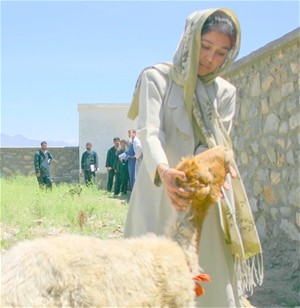Home » Reports & Data » Progress » Transforming Lives » First Woman Para-Veterinarian in Afghanistan

After Fareba Miriam graduates from para-veterinarian training she will have the necessary skills to manage her own Veterinary Field Unit.
Jeremy Foster RAMP/Afghanistan
386 Veterinary Field Units have been established in 31 provinces
1 MAY 2006 | FAYZABAD, BADAKHSHAN PROVINCE
“Women are largely responsible for tending to animals in Afghanistan. There really is a need for women veterinarians to work with them.” --Fareba Miriam
In March 2006, Fareba Miriam became the first woman to enroll in the para-vet training program sponsored by the United States Agency for International Development’s (USAID) Rebuilding Agricultural Markets Program (RAMP). She learned about the para-vet training when she was teaching geography at a high school in Fayzabad, Badakhshan, a northern province of Afghanistan. Fareba is 26, the eldest daughter in a family of 12. Although her family does not raise livestock, many members of her community are dependent on healthy herds and flocks to maintain their livelihood.
Fareba is attending a para-vet program for six months at one of the training centers, which are located in Parwan, Hirat, and Balkh provinces. Participants attend classes in pharmacology, nutrition, disease identification, anatomy, and pathology, and receive practical training at rural veterinary clinics. Business management courses, preparing the para-vets to manage Veterinary Field Units, are also an integral part of the program. When Fareba graduates she will return home where she plans to open a Veterinary Field Unit. She recognizes that many women in Afghanistan are responsible for raising animals and that a woman-run veterinary unit would be beneficial to her community.
The USAID’s Rebuilding Agricultural Markets Program will provide Fareba with equipment, furniture, and initial operating capital to help establish a Veterinary Field Unit. Vaccines are ordered in bulk and sold to para-vets who in turn charge market prices for vaccinating livestock. The para-vets deliver a range of veterinary services including conducting diagnostic services, delivering vaccinations, and performing basic surgery on livestock and poultry in rural communities. Operating as small businesses will allow Fareba and other para-vets a chance to generate income to contribute to the support of their families while providing a valuable service to their communities.
Responding to the need to improve livestock health and reduce mortality rates, USAID has established 386 Veterinary Field Units in 31 provinces throughout Afghanistan.







Comment
Make a general inquiry or suggest an improvement.